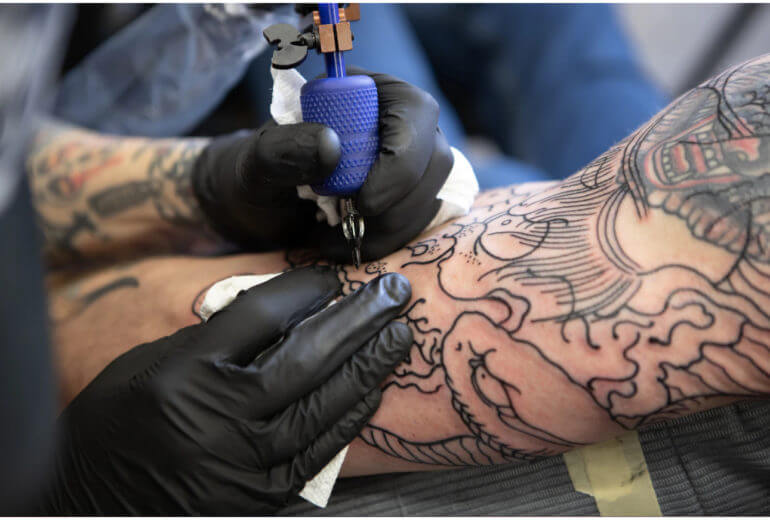
Can You Be Buried In A Jewish Cemetery With Tattoos?
Dear Jew in the City,
My friend said you can’t be buried in a Jewish cemetery with tattoos – is that true?
Thanks,
Alexander
Dear Alexander-
That Jews with tattoos cannot be buried in a Jewish cemetery is a persistent myth, right up there with “Jews don’t believe in Hell.” And, like “Jews don’t believe in Hell,” it occasionally finds its way into pop culture, which only reinforces the misinformation and exacerbates the problem. I am aware, for example, of an episode of Curb Your Enthusiasm in which Larry David’s mother has to be exhumed and reinterred in a “special section” of the cemetery because they discovered that she had a tattoo. (How they made such a discovery after she was buried is a mystery!) This, of course, has no basis in fact.
There is a strong hypothesis about how the “Jews with tattoos” myth got started. In theory, it was a myth perpetuated by parents of previous generations as a scare tactic to keep their younger generations from getting tattooed. That such a tactic would be employed specifically in the case of tattoos makes sense because tattoos are by definition permanent. It’s easier for one who has strayed to come back from a period of Sabbath-desecration or cheeseburger-eating without a permanent reminder of his time outside the community than it would be for one who has marked himself indelibly. Coming back after a lapse in observance with a tattoo would potentially create social problems, from embarrassment at the mikvah to difficulties in matchmaking. So it makes sense that earlier parents would try to spare their children from all the baggage that comes with an irrevocable decision they might later regret. (Even in today’s tattoo-friendly society, tattoo regret is a real thing. Tattoo removal is a big business but it’s expensive, painful, and the results are not perfect. I’ll share a story about tattoo regret at the end.)
Why should tattooing be the burial deal-breaker? Because it becomes a permanent part of one’s body? That’s not the only lapse in Torah-observance with such an effect. I heard an idea when I was in high school that really shook me up. You know the expression “you are what you eat?” That’s literally true in that our bodies break down the food that we eat and use it to reconstruct our very cells. So bacon, shrimp and other non-kosher foods that we eat literally become a part of us, which is especially scary if you assume that such things are spiritually unhealthy. Nevertheless, one’s whole body could be built from reconstituted lobster and pork chops but it wouldn’t get one barred from his local Jewish cemetery.
Objectively speaking, tattooing is no worse than any other violation of Torah law, it’s just more visible. And we have this thing called teshuvah (repentance), which wipes the spiritual slate clean if not the epidermis. So if one does go astray and get tattooed, they can still rejoin the community with all rights and privileges, including burial in a Jewish cemetery. The problem with perpetuating a myth to the contrary is that generations grew up believing it and never had occasion to discover that it’s simply not true.
I’ve been talking about people who were raised in observant communities because I believe that’s the context in which the misconception evolved but wayward youth from observant homes are not the only ones whom such a myth affects. Right off the bat there are baalei teshuvah (those raised non-observant, who later become observant) and converts, including former NBA players. And let’s be realistic, this matter doesn’t only affect the Torah-observant; even Jews who are not particularly observant are usually buried in Jewish cemeteries! And all of this doesn’t even account for those who were forcibly tattooed against their wills, such as prisoners in the concentration camps. Regardless of one’s level of religious observance or how a tattoo was acquired, it does not affect one’s burial site.
Now, I may seem to be tattoo-friendly – indeed, I have many friends with tattoos, and I recognize such is their prerogative – but don’t mistake that for an endorsement. I must stress that, ability to be buried notwithstanding, getting a tattoo is still an overt Torah prohibition (Leviticus 19:28). Dispelling the myth about tattoos doesn’t mean that it’s permitted, just that it’s not inherently any worse than anything else the Torah forbids.
Now, as promised, my tattoo-regret story. I always say that, when looking at old photos, we say things like “What was I thinking with that haircut?” or “Can you believe we used to wear that?” For this reason, even if tattooing were permitted, I wouldn’t have the confidence in my fashion sense to make such a lifelong statement. The following story illustrates such a point:
Many years ago, an incoming high school senior contacted me and asked for a reason – other than the Torah prohibition – for them not to get a tattoo of their school’s sports team logo. (I am obscuring the person’s gender and sport for reasons of privacy.) I had suggested a number of reasons, including that one’s zeal for the sport might fade and that the things that are important to us in high school are not usually lifelong passions but this person was team captain and star player so they couldn’t foresee that possibility. I later heard from them that they had sustained an injury over the summer, ending their sports career. Had this person gotten the team logo tattoo, it could have been a very painful constant reminder.
Similarly, there are plenty of people who have tattoos of bands they no longer like. Out of curiosity, I Googled it and found a surprising number of people with Louis CK tattoos, which probably no longer seems like such a good idea. The potential examples are endless. So, if the Torah prohibition is not enough for you and I have removed the Jewish cemetery impediment, please think twice before taking such a step.
Sincerely,
Rabbi Jack Abramowitz
JITC Educational Correspondent
Rabbi Jack Abramowitz’s “The God Book,” can be purchased here.
If you found this content meaningful and want to help further our mission through our Keter, Makom, and Tikun branches, please consider becoming a Change Maker today.







